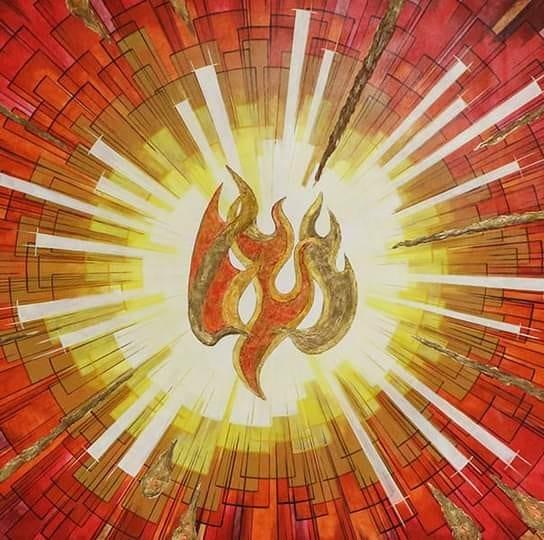FAUSTO GOMEZ OP
A bishop was showing the Church of the Blessed Trinity (Rome) to a group of Japanese tourists. The central altar had a beautiful painting of the Blessed Trinity. One tourist pointing to the painting asked the bishop: “Who is that Honorable Bird?” The Honorable Bird is the Dove, which represents the Holy Spirit. At Jesus’ Baptism by John the Baptist, the Spirit descends upon the Son of God “in the form of a dove, come from Heaven” (Jn 1:32). Jesus Christ, God and Man, the Son of God and the Son of Mary, rose from the dead, ascended into heaven and sent with God the Father the Holy Spirit to the Apostles, to the Church.
The descent of the Holy Spirit on the apostles took place on Pentecost, that is, fifty days after the Passover, the great feast of the Jews commemorating God’s gift of the law – of the tablets with the Ten Commandments. For Christians, Pentecost signifies reliving liturgically the experience of the descent of the Holy Spirit upon the Church.
St. Luke (Acts2:1-13) narrates the coming of the Holy Spirit upon the Apostles: the strong wind, the tongues of fire, and the consequent miraculous preaching of the Apostles. The descent of the Holy Spirit underlines the universality of the message of salvation: God wants the salvation of all, and Jesus, His Only-Begotten Son died to save all.
The Holy Spirit is the Third Person of the Blessed Trinity. The Holy Spirit proceeds from the Father and the Son (Creed). He is the love of the Father and the Son. “Now just as the Word of God is the Son of God, so is God’s love the Holy Spirit. Consequently, a man has the Holy Spirit when he loves God” (St. Thomas Aquinas, On the Creed; cf. CCC, Nos. 683-741).
Jesus was conceived by the power of the Holy Spirit. “Since our weak minds cannot comprehend the Father or the Son, we have been given the Holy Spirit as our immediate advocate, to shed light on that hard doctrine of our faith, the incarnation of God” (St. Hilary). The Third Divine Person enlightens us to know Jesus deeply, and He strengthens us to follow Him faithfully and courageously. “Anyone who does not have the Spirit of Christ does not belong to him” (Rom 8:9).
In our own Baptism, we were baptized in the Blessed Trinity and received the Spirit (cf. Mt 28:19). One article of our faith: “I believe in the Holy Spirit,” who is the Paraclete,that is,the consoler.Heis the Spirit of grace, love, truth, and freedom. He teaches us the truth (Jn 14:17 and 16:13). He makes us truly free: “Where the Spirit of the Lord is, there is freedom” (2 Co 3:17). He helps us to pray (cf. Rom 8:26; 1 Cor 12:3). The Holy Spirit, moreover, is our aid when we are persecuted (Mt 10:19-20). He is the Spirit of joyful courage. “After receiving the Holy Spirit in the form of potent tongues of fire, the disciples are converted, and their timorousness vanishes. Completely transformed, they become enlightened, resolute and ready to preach, bear witness and fight for truth” (Romano Guardini, The Lord).
After Jesus’ Ascension into heaven, we are in the age of the Holy Spirit. It seems that for a long time the Holy Spirit was “the Forgotten One.” From the second half of the 20th century and onward, especially after Vatican II (1962-1965), the Third Person of the Blessed Trinity has increasingly become – it clearly appears – more existentially present in Christian communities, thanks in part to the vibrant charismatic movement. Today the theology of the Holy Spirit, Pneumatology, is a prominent branch of dogmatic and spiritual theology. Truly, the Holy Spirit is an essential part of Christian spirituality.
The Holy Spirit is our Advocate: “I will send you the Advocate from the Father” (Jn 15:26). He assists and supports us(cf. Jn 14:16-17). The Holy Spirit is the sanctifier, the agent of holiness. He showers upon us the divine grace to be holy, the grace that makes us God’s children: sharers in the very divine nature. He pours on us his Seven Gifts (cf. Is 11:1-2). He invites us continually to be holy. As God’s children we are called to holiness, that is, to loving union with God. In our journey of life to God’s home, we have to walk according to the Holy Spirit, which is holiness.
Is it hard to be holy? “Just one step beyond mediocrity and you are a saint” (Leon Bloy). We have to really want to be holy: “to want it, to want it and to want it” (St Thomas Aquinas). “I will, I want, with God’s blessings, to be holy” (Saint Theresa of Kolkata). Holiness centers on loving God, loving all neighbors, principally the needy and vulnerable, and loving God’s creation. Holiness simply means to do every day what we ought to do with ascending love: to put love in everything we do – big or small.
The Holy Spirit is the agent of evangelization. Christian faith, a saving faith, is directed to all. The followers of Christ are God’s chosen instruments to announce the Good News of salvation to the whole of creation (cf. Mk 16:15).
The Holy Spirit keeps coming to our life as a strong wind, and with tongues of fire. He is – someone explains – like the wind that takes us to the whole world to announce the Good News of Christ. The Holy Spirit in us is like the tongue that preaches the truth. He is like the fire of love in us, a fire that burns our selfishness and places Jesus’ love at the center of our souls. The Holy Spirit is “the living flame of love” (St. John of the Cross). Thus, with the grace of the Holy Spirit we are able to show God’s merciful face to a wounded humanity.


 Follow
Follow


